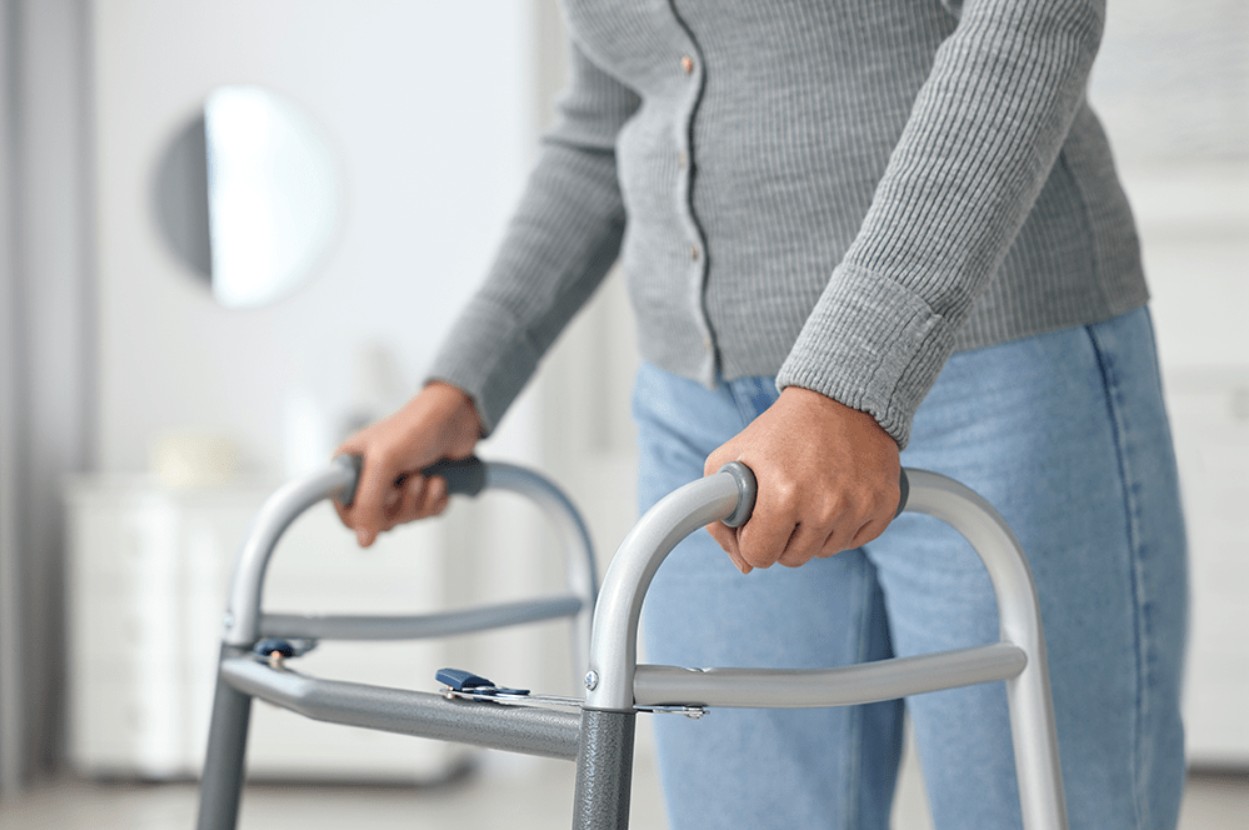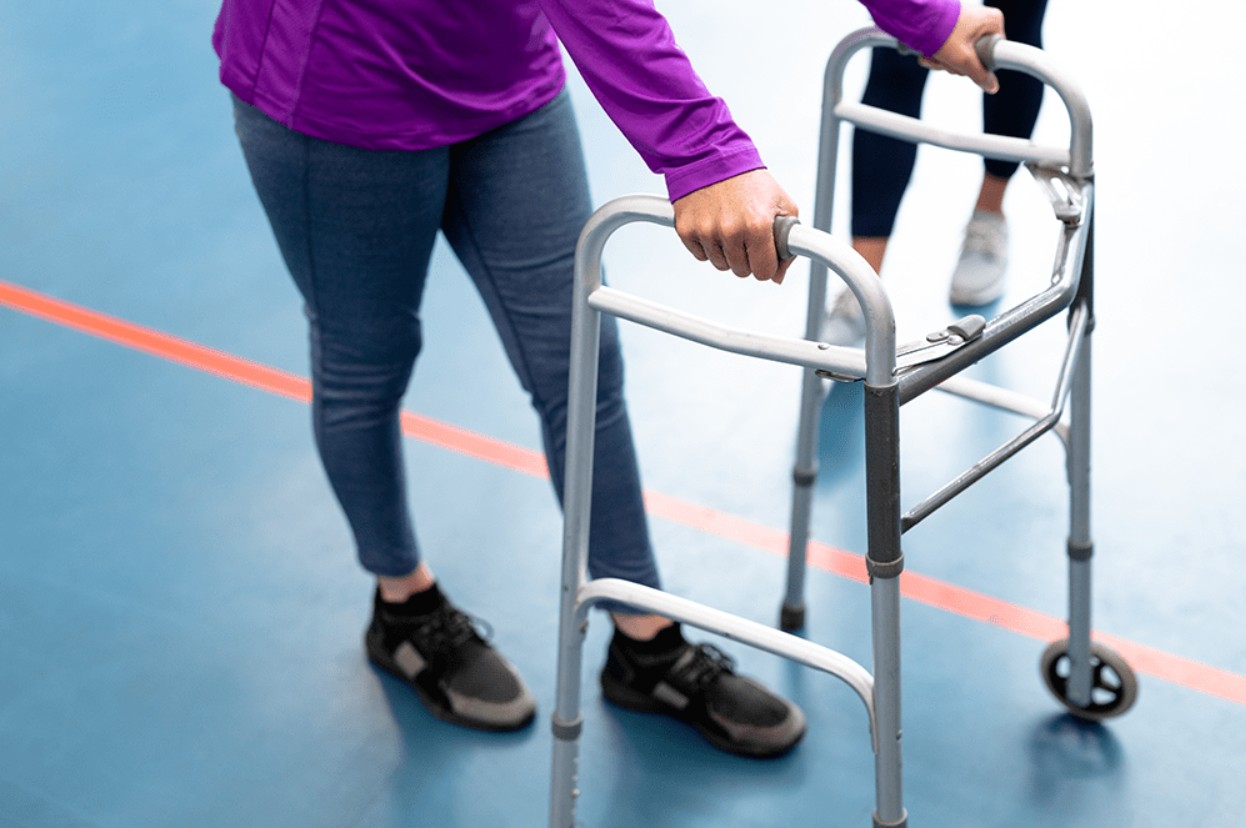
Quick Summary:
Walkers offer increased stability, mobility, and balance. This blog explores the differences between folding and standard walkers — discover how their features suit your mobility needs.
Click a link to jump to the section.
Introduction
Many individuals need walkers for stability and independence. Improving daily mobility with the right walker can be momentous for those seeking long-term support.
Choosing the right mobility aid protects user independence. The ideal walker not only improves mobility, but also enhances safety, comfort, and convenience. In this blog, we’ll discuss the differences between folding and standard walkers. We’ll also look at safety considerations when selecting a walker to help you make an informed decision.


What Is a Standard Walker?
A standard walker has four rubber-tipped legs and no wheels.1 This is the most stable option, though it requires users to lift it as they walk.
One difference between traditional walkers vs. modern designs is that traditional walkers don’t have add-ons. Modern walkers have seats, storage baskets, and wheels for mobility.
Standard walkers are a secure choice for those with significant mobility limitations. Options include durable non-folding walkers, heavy-duty walkers for extra support, and high-stability walkers for medical use. The best standard walkers for seniors have fall-prevention features for balance.
Pros and cons of standard walkers include:
Pros:
- High stability
- Durable frame
- Wide base for weight-bearing support
Cons:
- Bulky
- Less portable
- Harder to store
What Is a Folding Walker?
Adjustable folding walkers are great for those needing occasional support. They are convenient walkers for easy storage.
Foldable mobility aids are the best travel-friendly walkers. As such, they are the ideal walkers for active seniors on the go. Consider your storage, travel, and mobility requirements. Many compact and lightweight walker options are sure to suit your needs.
Pros and cons of folding walkers include:
Pros:
- Compact frame
- Easy to transport
- Convenient for travel
Cons:
- Can be difficult to operate
- Often less stable than a standard frame
- Potential failure with the folding mechanism
1. Stability and Support Needs
Deciding between standard and folding walkers involves recognizing your specific needs. For example, you might prefer standard walkers for better balance and mobility. Standard frames provide extra-supportive walkers for limited mobility. They are great if you are choosing a walker for fall prevention.
If you need standing assistance with a walker, focus on safety and stability. The same goes if you’re looking for the best walker for post-surgery recovery.
2. Portability and Storage
Walkers that fit in car trunks and small spaces ensure easier storage and transportation. The best walkers for travel and portability are compact and foldable. Comparing walker storage options can help you decide which type of walker best suits your needs.
Because they are compressible, folding walkers can be stored more easily. For a mobility aid that fits in narrow spaces, consider foldable compact walker options for home use.
3. Weight and Durability
When looking for long-lasting mobility aids, it is important to compare lightweight vs. heavy-duty walkers. Standard walkers are some of the best durable walkers for daily use. Because they lack a folding mechanism, standard walkers tend to be lighter and sturdier.2
As an individual seeking a mobility aid, you might have weight capacity considerations for walkers. Because aluminum and steel are common materials found in walkers, it will be useful to weigh their differences. Frame materials: aluminum vs. steel walkers:3
Aluminum:
- Lighter frame
- Easier to push
- Mobile
Steel:
- Stronger frame
- Higher weight capacity
- Durable
4. Accessories and Add-Ons
Some users want walkers with seats for added comfort or walkers with storage pouches and baskets. The best walker accessories for convenience include seats, trays, baskets, glide caps, and cup or cell phone holders.
For better mobility, consider adding wheels to a standard walker or glide caps and rubber tips for walkers.
Best Folding and Standard Walkers for Different Needs
The greatest mobility aids include top-rated folding walkers for seniors and budget-friendly walker options. Many customer-recommended walker models are available, along with highly reviewed mobility walkers. Here are some best-selling standard walkers for support, price, mobility, and stability:


Drive Portable Folding Travel Walker, 5" Wheels, Fold up Legs
Drive Portable Folding Travel Walker is a highly portable option. With an easy folding mechanism, it folds into 1/4 the size of a traditional walker.
Key Features
- Adjustable Height
- Lightweight Frame
- Built-In Storage Pouches
Specifications
- Manufacturer: Drive Medical
- Wheel Size: 5 Inches
- FSA/HSA Eligible: Yes
Customer Review
“Love my pretty red walker! It is fashion-forward & easy to use!”
MJM PVC Walker with Outriggers
With healthcare-grade PVC and anti-tip outriggers, the MJM PVC Walker with Outriggers ensures long-term stability.
Key Features
- Reinforced at Stress-Related Areas
- Adjustable Arms and Belt
- Fall-Prevention Outriggers
Specifications
- Manufacturer: MJM International
- Weight: 34 Pounds
- Weight Capacity: 300 Pounds
Customer Review
“Our PVC Walker for our disabled son is lightweight and easy to move. Outriggers on the side help prevent the walker from tipping over. All the stress points are reinforced to provide durability and longer life. The arms are adjustable as well as the seat height is also adjustable to the needs of the individual.”
Two-Button Folding Walker without Wheels
The Two-Button Folding Walker without Wheels is a budget-friendly option with a convenient push-button folding mechanism.
Key Features
- User-Friendly
- Height-Adjustable Legs
- Sides Fold Independently
Specifications
- Manufacturer: Medline
- Height Adjustment: 32-39 Inches
- Weight Capacity: 300 Pounds
Customer Review
“I was very pleased with it, it opens easy , easy to walk with, just the right size.”
Medline Bariatric Folding Walkers - 500 - 650 lbs Capacity
The Medline Bariatric Folding Walkers - 500 - 650 lbs Capacity has an easy folding mechanism and high weight capacity. This hybrid model offers both convenience and support.
Key Features
- Durable 5-Inch Wheels
- Easily Folds With Two-Button System
- High Weight Capacity
Specifications
- Manufacturer: Medline
- Material: Aluminum
- Weight Capacity: 500-650 Pounds
Customer Review
“Very sturdy and rolls alot better than a regular walker!”
Medline Durable Aluminum Fold Up Mobility Rollator Walker with 6 Inch Wheels and Seat for Adults
The Medline Durable Aluminum Fold Up Mobility Rollator Walker has 6-inch wheels and a seat for comfort. According to customer reviews, this walker is very popular.
Key Features
- Spacious Storage Bag
- Padded Backrest
- Folds Easily for Quick Storage
Specifications
- Manufacturer: Medline
- Wheel Size: 6 Inches
- Weight Capacity: 250 Pounds
Customer Review
“Makes me walk faster,provides good posture support and stability.”
Who Should Choose a Folding Walker vs. a Standard Walker?
Transitioning from a cane to a walker involves accounting for specific needs. Users should evaluate when they need a folding walker and when a standard walker is the better choice.
Many end up choosing a walker based on lifestyle and activity level. As such, users reflect on walkers for temporary vs. long-term mobility support. Folding walkers are perfect for active individuals needing occasional support. Standard walkers are ideal for those with higher stability and mobility needs.
Conclusion
Finding the best walker for your needs means comparing walker options for better mobility. Recognizing the key differences between folding and standard walkers is important as you determine which is best for you. Folding walkers have a compact frame, making them easier to store and transport. Standard walkers are more supportive, though they are harder to stow away.
Making the right choice between folding and standard walkers hinges on your needs. With these in mind, you'll be on your way to improving independence with the right walking aid.
It helps to know where to buy high-quality mobility walkers. Explore our variety of walkers to find the best mobility aid for you.
Footnotes
1 "Mayo Clinic (2023, August 15)." Tips for choosing and using walkers
2 "Speight, A. (2021, October 20)." Folding vs Rigid Wheelchair Frames: How to choose? Motion Composites.
3 "Mission Medical Supply." How to choose a suitable rollator?


Login and Registration Form